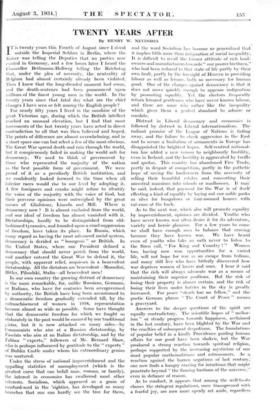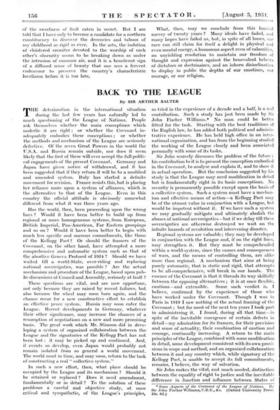TWENTY YEARS AFTER
By 'HENRY W. NEVINSON
IT is twenty years this Fourth of August since I. stood outside the Imperial Schloss in Berlin, where the Kaiser was telling the Deputies that no parties now ;existed in Germany, and a few hours later I heard the Chancellor Betlunann-Hollweg telling the Reichstag that, under the plea of necessity, the, neutrality of Belgium had almost certainly already been violated. Then I knew that the long-dreaded moment had come, and the death-sentence had been pronounced upon millions of the finest young men in the world. In the twenty years since that fatal day what are the chief changes I have seen or. felt among the English people?
For nearly fifty years I lived in the sunshine of the great Victorian age, during which the British intellect reached an unusual elevation, but I find that most movements of the last twenty years have acted in direct contradiction to all that was then believed and hoped. The points of difference are almost overwhelming, and in a short space one can but select a few of the most obvious. The Great War spread death and ruin through the world, but it conspicuously failed in making the world safe for democracy. We used to think of government by those who represented the majority of the nation as the best possible form of government. We were proud of it as a peculiarly British institution, and we confidently looked forward to the time when all inferior races would rise to our level by adopting it. A few foreigners and cranks might refuse to identify the voice of the majority with the voice of God, but their perverse opinions were outweighed by the great names of Gladstone, Lincoln and Mill. Where is democracy snow ? It is almost excluded from the world, and our ideal of freedom has almost vanished with it. Dictatorships, hardly to be distinguished from old- fashioned tyrannies, and founded upon a cruel suppression of freedom, have taken its place. In Russia, which many regard as having the most advanced social system, democraey is derided as " bourgeois " or British. In the United States, where one President defined a democracy that should never perish from the world, and another entered the Great War to defend it, the people, with apparent relief, acquiesce in a benevolent dictatorship. All the dictators are benevolent—Mussolini, Hitler, Pilsudsli, Stalin—all benevolent men !
In our own, country the growing distrust of democracy is the , more remarkable, for, unlike Russians, Germans, or Italians, who have for centuries been overgoverned by authority, the British have long been accustomed to a democratic freedom gradually extended till, by the enfranchisement of women in 1918, representation became almost as wide- as possible. Some have thought that the democratic freedom for which we fought so obdurately in the past would be ensured by our traditional pietas, but it is now attacked on many sides—by Communists who aim at a Russian dictatorship, by Fascists who aim at an Italian dictatorship, and by the Fabian "experts," followers of Mr. Bernard Shaw, who is perhaps influenced by gratitude to the " experts " of Dublin Castle under whom his extraordinary genius was nurtured.
Under the stress of national impoverishment and the appalling statistics of unemployment (which is the greatest curse that can befall man, woman, or family), the interest in economics has swallowed most other interests. 'Socialism, which appeared as a grain of mustard-seed in the 'eighties, has developed so many branches that one can hardly see the tree for them, and the word Socialism has become so generalized that it implies little more than indignation at social inequality.
It is difficult to recall the former attitude of rich land- owners and manufacturers towards" our poorer brethren," who had been reduced to (lint state of life partly by their own fault, partly by the foresight of Heaven in providing labour as well as leisure, both so necessary for human good. One of the charges against democracy is that it does not move quickly enough to appease indignation by promoting equality. 'Yet the electors frequently return leisured gentlemen who have never known labour, and there are some who rather like the inequality which gives them a genteel standard to admire or emulate.
Distrust in Liberal democracy and economies is followed by distrust in Liberal internationalism. The radiant promise of the League of Nations is fading away, and the failure to check aggression in the East and to secure a limitation of armaments in Europe has disappointed the brightest hopes. Self-centred national- ism has added a new venom to neighbourly hostility, even in Ireland, and the hostility is aggravated by tariffs and quotas. This country has abandoned Free Trade, partly in despair at competition, partly in the pathetic hope of saving the landowners from the necessity of selling their beautiful estates and converting their ancestral mansions into schools or madhouses. It may be said, indeed, that payment for the War is of itself effecting a kind of equality by laying out our noble parks as sites for bungalows or four-roomed houses with cat-runs at the back.
As to the next war, which also will promote equality by impoverishment, opinions are divided. Youths who have never known war often desire it for its adventure, variety and heroic glamour. For a few years to come we shall have enough men to balance that craving because they have known war. We have heard even of youths who take an oath never to listen to the Siren call, "For King and Country ! " Women too, having now won opportunities for a varied life, will not hope for war as an escape from tedium, and many still live who have bitterly discovered how war deprives women of lovers and sons. I hear it said that the rich will always advocate war as a means of maintaining their superior positions. But the risk of losing their property is almost certain, and the risk of losing their lives under battles in the sky is greatly increased. For peace "death has no fellow," and the poetic German phrase "The Court of Peace" means a graveyard. Answers to the deeper questions of the spirit are equally contradictory. The scientific hopes of " melior- ism " or steady progress towards happiness, acclaimed in the last century, have been blighted by the War and the cruelties of subsequent despotisms. The foundations of popular belief in a kindly Providence guiding human affairs for our good have been shaken, but the War produced a strong reaction towards spiritual religion, perhaps supported by the increasing mysticism of our most popular mathematicians and astronomers. As a reaction against the barren negations of last century; one now finds a hungry craving for intuitions that might penetrate beyond " the flaming bastions of the universe," even in defiance of reason.
As to conduct, it appears that among the well-to-do classes the stringent regulations, once transgressed with a fearful joy, are now more openly set aside, regardless of the sweetness of fruit eaten in secret. But I am told that I have only to become a candidate for a. northern constituency to discover the decencies and taboos of my childhood as rigid as ever. In the arts, the isolation of cloistered eremites devoted to the worship of each other's obscurity seems to be breaking down as under the intrusion of common air, and it is a beneficent sign of a diffused sense of beauty that one sees a fervent endeavour to preserve the country's characteristic loveliness before it is too late. What, then, may we conclude from this hurried survey of twenty years ? Many ideals have faded, and many hopes have failed us, but, in spite of all losses, our race can still claim for itself a delight in physical and even mental energy, a humorous aspect even of calamities, an unyielding resolution to maintain our freedom of thought and expression against the benevolent behests of dictators or doctrinaires, and an inborn disinclination to display in public the depths of our emotions, our courage, or our religion.































 Previous page
Previous page